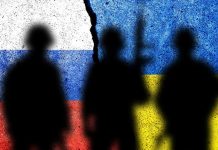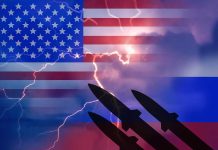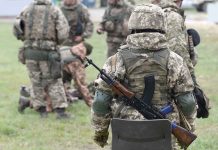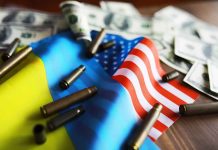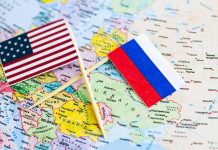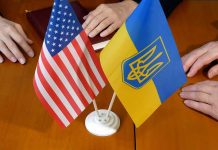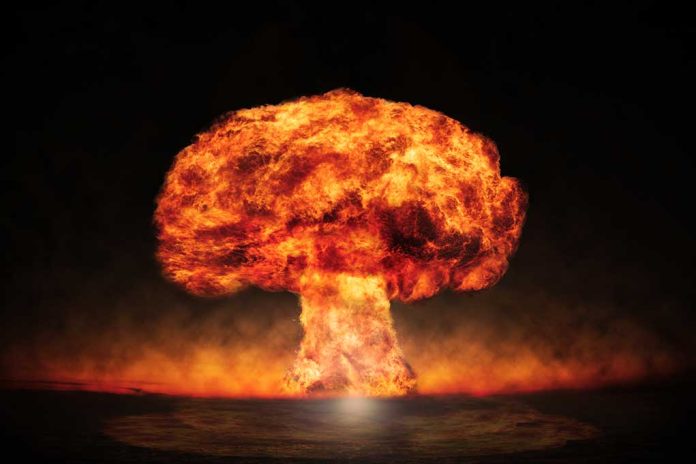
Ukraine’s President Volodymyr Zelensky demands nuclear weapons or NATO membership to deter Russian aggression, sparking international debate on security guarantees.
Top Takeaways
- Zelensky calls for nuclear weapons or NATO membership as security guarantees against Russia.
- Ukraine’s NATO application, submitted in 2022, faces resistance from key alliance members.
- The 1994 Budapest Memorandum, which saw Ukraine give up nuclear weapons, is criticized for inadequate security assurances.
- Western allies are urged to increase support for Ukraine to bolster NATO deterrence against Russia.
- U.S. officials express skepticism about Ukraine regaining nuclear weapons.
Zelensky’s Bold Demand: Nuclear Weapons or NATO Membership
In a startling declaration, Ukrainian President Volodymyr Zelensky has issued an ultimatum to the West: provide Ukraine with nuclear weapons or expedite its NATO membership. This dramatic stance comes as Ukraine continues to face Russian aggression, highlighting the country’s desperate need for robust security guarantees.
Zelensky’s call for nuclear armament or NATO integration stems from Ukraine’s frustration with the prolonged process of joining the alliance. Despite applying for NATO membership at the onset of Russia’s full-scale invasion in 2022, Ukraine has yet to receive an official invitation. The delay has left the country outside of the alliance as it continues to fight against Russian threats.
Do you think sending nuclear weapons to Ukraine is a good idea? pic.twitter.com/GJeptS67mb
— Colton Blake 🇺🇸 (@ColtonBlakeX) February 6, 2025
The Budapest Memorandum: A Failed Security Guarantee
Zelensky’s provocative statement brings attention to the 1994 Budapest Memorandum, an agreement that saw Ukraine relinquish its nuclear arsenal in exchange for security assurances. The Ukrainian leader now criticizes this decision, arguing that it left the country exposed to Russian aggression.
The failure of the Budapest Memorandum to prevent Russian invasions has sparked discussions about Ukraine potentially developing its own nuclear deterrent. However, Kyiv maintains that NATO membership remains its preferred security guarantee.
Western Response and NATO’s Stance
The West’s reaction to Zelensky’s demands has been cautious. NATO Secretary General Mark Rutte has urged increased support for Ukraine, emphasizing the need to bolster NATO’s deterrence against Russia and its allies. However, key alliance members, including the United States, Germany, Hungary, and Slovakia, have shown resistance to Ukraine’s immediate entry into NATO.
U.S. officials, including retired Lt. General Keith Kellogg, have expressed skepticism about the possibility of Ukraine regaining nuclear weapons. Kellogg stated that the chances of such a scenario are “somewhere between slim and none,” reflecting the complex geopolitical considerations at play.
Ukraine’s Strategic Dilemma
As Ukraine continues to defend itself against Russian aggression, the country faces a strategic dilemma. While willing to fight without NATO troops on the ground, Ukrainian officials stress the need for robust security guarantees. The ongoing conflict has highlighted Russia’s significant military capabilities, including its potential to mobilize millions of troops and its alleged support from North Korean forces.
“Russia is not weak, Russia is not weak. Russia has millions of people — Russia can mobilize 8 million [more] people, and Russia has North Korean [troops,],” said a senior Ukrainian intelligence official.
As diplomatic efforts continue, the international community remains focused on finding a peaceful resolution to the conflict. However, the path forward remains uncertain, with potential compromises and concessions yet to be disclosed or agreed upon.


